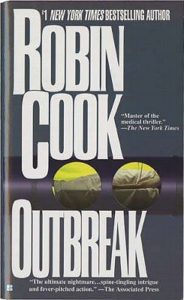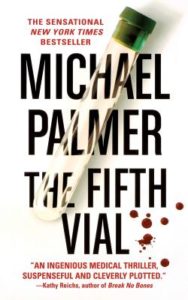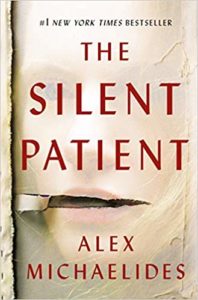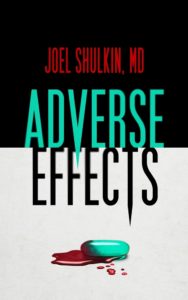Recently, I asked readers in a Facebook group to name their favorite medical thriller novels. With rare exception, everyone named books by Robin Cook, Tess Gerritsen, or Michael Palmer. I don’t blame them—these were my favorite authors as well. Gerritsen’s Harvest and Palmer’s Extreme Measures remain two of my all-time favorite novels, and Palmer helped me embark on own writing career. But it got me thinking. What do readers expect from medical thrillers? Search through the book blurbs by these three authors and you’ll see a common theme: most (but not all) are set in an emergency room or an operating room. The reason for this is obvious. Emergency rooms are exciting. Why else would ER have lasted fifteen seasons (ten of those without Clooney)? And operating rooms, while not as fast-paced, are intense, as surgeons dig around inside living bodies, and one false move can spell disaster. Who can forget the gut-wrenching scene when a psychotic patient stabbed Drs. Carter and Knight, only for Knight to die in the catheter lab?
Does that mean a medical thriller is only exciting if it’s set in the ER? Can it be suspenseful without long scenes involving doctors performing advanced life support procedures?
There are thirty-five other non-surgical physician specialties besides emergency and intensive care medicine, and in each one there is plenty of opportunity for something to go wrong, intentionally or unintentionally (and, of course, it’s the intentional that make for a gripping thriller). And even that doesn’t include all the therapy programs, research labs, hospices and other health care settings where crazy and terrifying things can happen. Falling under the crime fiction umbrella, medical thrillers are not the same as medical drama. In a drama, like ER, the focus is on the diagnosis and treatment of rare diseases and conditions, and the thrill emerges from uncovering the answer in time. In a medical thriller, sometimes it’s simply a race against the clock to stop a contagious outbreak. But threats arrive in different forms: biologic, technological, or forensic. Finding the answer is a significant part, but the suspense commonly lies in identifying and stopping whoever’s behind the threat. The villain!
As a developmental-behavioral pediatrician, I spend very little time in the emergency room, and none in an operating room. So, when I think of medical mysteries and malfeasance, I often think outside the trauma box. My debut medical thriller, Adverse Effects, involves psychiatrist Cristina Silva and an experimental memory drug implicated in the deaths of her patients—a drug she’s also taking. Silva’s quest for answers takes her from her Boston-based private practice to the favelas of Rio de Janeiro, and through the chaotic jungles of her own mind. If you like stories set outside the ER, you’ll love Adverse Effects and these seven other medical thrillers.
Outbreak by Robin Cook
When asked to name a novel by Robin Cook, widely considered the founding father of medical thrillers, most think of his debut Coma. But I chose Outbreak, featuring a pediatrician turned CDC epidemiologist who investigates a devastating Ebola outbreak that may have been deliberate. While there are hundreds of books about plagues and epidemics—and likely many more to come after this year—this is a good example of a how a medical thriller doesn’t have to be only about solving a medical mystery or racing for a cure. The what is clear in this book. It’s the who and why that will leave you in a cold sweat.
Postmortem by Patricia Cornwell
Morgue scenes provide an extra-creepy setting to medical thrillers, with gruesome autopsies and the smell of death always lingering in the background. For the medical examiner, the goal is not to save the patient, but to find out what happened to save the next. The first book in Cornwell’s Kay Scarpetta series, where a heroic ME (Medical Examiner) attempts to unmask a sadistic killer before she becomes a victim, is arguably her best, setting the bar high for the numerous forensic thrillers that follow.
The Fifth Vial by Michael Palmer
Okay, this one is cheating a bit. There are some OR scenes as Palmer pits a medical student against an organ trafficking scheme. But much of the medical part of the story takes place outside the hospital in a secret clinic hidden in the Brazilian rainforest and at the clandestine Whitestone Foundation. While a heavy dose of suspended disbelief is necessary, there’s more than enough tension to keep the pages turning.
The Silent Patient by Alex Michaelides
Set primarily in an inpatient psychiatric unit, The Silent Patient demonstrates how suspenseful—and disturbing—psychotherapy can be, especially when both therapist and patient have something to hide. Blending in Greek tragedy and unexpected twists, Michaelides proves intense psychological conflict can be just as heart-stopping as a cardiac resuscitation scene.
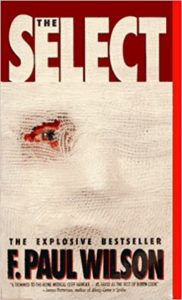
The Select by F. Paul Wilson
A different type of medical thriller, the novel Wilson originally published in 1994 delves into the dangers of medical school (perhaps following the dark corridors of Samuel Shem’s House of God to their natural, and terrifying, end), particularly one that brainwashes its students. Wilson isn’t a doctor, but his portrayal of medical student life, from taking the MCAT’s to clinicals on the wards, brought back memories, albeit with a far more sinister threat lurking in the background than I ever experienced.
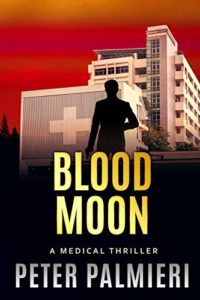
Blood Moon by Peter Palmieri
One of the few thrillers featuring a pediatrician (which immediately caught my interest), Blood Moon is the medical equivalent to John Grisham’s The Firm. There are numerous patient encounter scenes, inpatient and outpatient, but they’re mostly backdrop for Dr. Snow’s race to escape the clutches of a corrupt hospital before he becomes their next victim.

Gravity by Tess Gerritsen
While most know Gerritsen for her Rizzoli & Isles series, she wrote a number of terrifying standalone medical thrillers. Harvest is my favorite, but to finish off this list, I chose Gravity, which takes readers far beyond the ER to the final frontier. Again, cheating a little as there are a few ER scenes in the beginning, but they’re really just the appetizer before the main course. When an experiment aboard a space station goes wrong, a physician researcher must stop an outbreak of mutated cells before all the astronauts aboard the station die. Gerritsen’s research on NASA is impressive, and the medical suspense boosts this novel out of the stratosphere.
*


